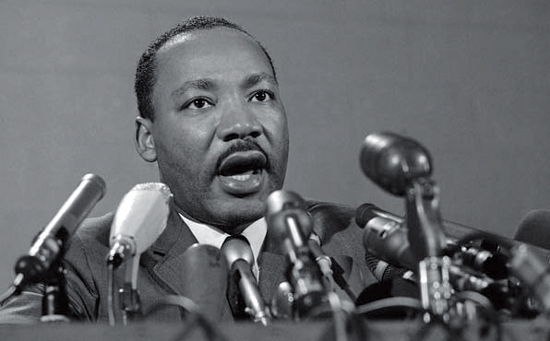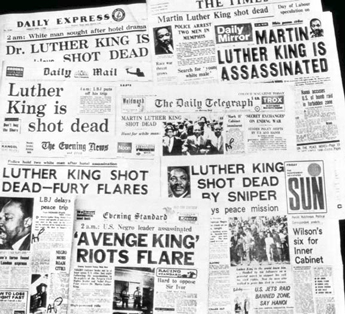CHARLENEM and Starla Muhammad -Final Call Staffers-

Nearly 50 years after murder civil rights leader’s death, questions about who killed him still raised
While Dr. Martin Luther King, Jr. was lauded, his life celebrated, and his legacy praised on the day that commemorated his birth, there remained lingering questions about his assassination and whether all the facts surrounding his death are known.
A small but determined group is working to get answers to their remaining questions about the slain civil rights leader, gunned down April, 4, 1968 as he stood on the balcony of the Lorraine Motel in Memphis, Tenn.
“How do we celebrate and honor Dr. King, who is one of my heroes, when we dishonor him by not bringing up the truth in terms of his assassination,” said Sadiki Kambon, activist and director of the Black Community Information Center in Boston.
The non-profit group with roughly 35 to 50 members began speaking out about their unanswered questions, calling it the “In Justice for Dr. King” campaign in the year 2000, according to Mr. Kambon.

This year from Jan. 20-24 “King Week” was celebrated with interfaith prayer breakfasts, parades, exhibits, school poems, plays, recitations and panel discussions on equality and civil rights for all. But the real struggle for justice for Dr. King, bringing those responsible for his murder to justice, languishes, said Mr. Kambon.
His organization wants letters, calls and e-mails sent to the Justice Department and White House to demand that Attorney General Eric Holder and President Barack Obama open a grand jury investigation into Dr. King’s murder.
It is widely known that Dr. King was under continuous surveillance by the F.B.I. under the orders of then-Director J. Edgar Hoover with the approval of U.S. Attorney General Robert Kennedy.
“We now know, from the documents released by the FBI, an FBI director, J. Edgar Hoover, who had a pathological hatred of Martin Luther King, so much so that he directed his own agents to break the law repeatedly in going after King and taping King and having illegal surveillance on King,” journalist Gerald Posner said on PBS American Experience’s Roads to Memphis in an excerpt broadcast Jan. 20 on Democracy Now.
Some original FBI surveillance recordings of Dr. King are under seal by court order until 2027 based on a 1977 court case brought by King associate Bernard Lee.
James Earl Ray was arrested, pleaded guilty and was convicted of first-degree murder of Dr. King in 1969. He was sentenced to 99 years in prison. However, Mr. Ray soon recanted, saying he did not kill Dr. King and had years of unsuccessful attempts to get a new trial. He died April 23, 1998 at age 70 stemming from complications of Hepatitis C.
Friends and associates of Dr. King including Reverends Jesse Jackson, Andrew Young, historians and authors have raised questions about the murder and about the role the U.S. government may have played as part of a wider conspiracy.
In a 2008 interview on CNN special, “Eyewitness To Murder: The King Assassination,” with journalist Soledad O’Brien, Rev. Young, a top aide to Dr. King, said he thought there was a determination in very high places the civil rights movement be stopped.
“But it certainly went as far as the FBI. And the Memphis police. And the U.S. military,” he said according to the show transcript available on cnn.com.
In 1999 the King family successfully won a wrongful death lawsuit against Loyd Jowers, a Memphis restaurant owner who said he was part of a conspiracy with the U.S. government and Mafia to kill Dr. King and Mr. Ray was not involved. The Justice Department discounted his claims as “inconsistent” and not credible.
At the trial’s conclusion the jury found Mr. Jowers and “others, including government agencies” participated in a conspiracy to assassinate Dr. King.
“Four weeks of testimony, more than 70 witnesses, and a 1999 civil trial jury’s unanimous verdict that Dr. King was ‘assassinated as a result of a conspiracy’ was a step in the right direction but it’s not enough,” Mr. Kambon argued. Mr. Jowers died in 2000. A transcript of the trial can be found online at www.ratical.org.
In a Dec. 9, 1999 press conference after the ruling the late Coretta Scott King, widow of Dr. King, applauded the verdict, calling it a great victory for her family.
“The jury was clearly convinced by the extensive evidence that was presented during the trial that, in addition to Mr. Jowers, the conspiracy of the Mafia, local, state and federal government agencies, were deeply involved in the assassination of my husband,” said Mrs. King.
“The jury also affirmed overwhelming evidence that identified someone else, not James Earl Ray, as the shooter, and that Mr. Ray was set up to take the blame. I want to make it clear that my family has no interest in retribution. Instead, our sole concern has been that the full truth of the assassination has been revealed and adjudicated in a court of law,” added the King family matriarch.
“I have always believed that the government was part of a conspiracy, either directly or indirectly, to assassinate Dr. Martin Luther King Jr,” Rev. Jackson wrote in part in the forward to Mr. Ray’s 1997 autobiography.
Also in 1997 Dr. King’s youngest son Dexter, met with Mr. Ray. When asked by the younger King if he killed his father, Mr. Ray was quoted as saying, “No, no, I didn’t, no” to which Dexter King responded, “I believe you and my family believes you and we are going to do everything in our power to try and make sure that justice will prevail.”
Members of the King family supported Mr. Ray’s call for a new trial.
“I’m basically clear that Martin King was evidently in conflict with the United States government,” said Reverend Al Sampson of Chicago, the first minister who was ordained by Dr. King.
He had no details about the Boston campaign, but recalled Dr. King met with his national staff in August 1966 to share some sobering news and to restructure the Southern Christian Leadership Conference, which he co-founded.
“He said that a Black FBI agent told him that the United States government was going to assassinate him,” Rev. Sampson told The Final Call.
Two years later, Dr. King was murdered.
Rev. Sampson wonders why no one has mentioned or indicated they’ve sought to find Joseph Louw, who took the now iconic photograph moments after Dr. King’s assassination showing the fallen leader with trusted aides pointing in the direction of the shot. Ernest Withers, a photographer who was part of Dr. King’s inner circle, was a paid informant, according to a 2010 article in the Memphis Commercial Appeal.
Rev. Sampson hopes Mr. Kambon is “not on a fishing expedition with no pole and no bait.”
“If folks’ information is correct, from the Black FBI agent that the United States government assassinated King, do you really believe that they’re going to open up the information when you’re asking the alleged parties to come forth?” Rev. Sampson asked.
The question is, has some new information come out that has not been revealed to the King family or in the congressional investigation? he asked. As far as Rev. Sampson knows there have not been any new revelations.
He added, however, “I would hope that the United States government would through the FBI and the Justice Department open up their files and allow a blue ribbon panel, selected by the community and not by the government or politicians that might get bought out or sell out […] to draw some conclusions based on an in-depth research of information.”
Dr. Conrad Worrill, former chairman of the National Black United Front, supports the “In Justice for Dr. King” campaign.
Dr. King’s brutal assassination, unanswered questions and efforts to cover it up remain painful for Black people who want justice, he continued.
A U.S. House of Representatives Select Committee on Assassinations investigated the murders of Dr. King and President John F. Kennedy. The committee’s report was released in 1979. It concluded Mr. Ray killed the civil rights leader and though there “may have been a small scale conspiracy involved,” it “did not” involve any U.S. government agency.
Though unaware of the Boston efforts, activist Dick Gregory told The Final Call the book “Murder in Memphis: The FBI and the Assassination of Martin Luther King,” he co-wrote with attorney Mark Lane, jumpstarted investigations into the murders of Dr. King and President Kennedy.
“We asked for it all! I don’t know what they’re asking for an investigation for. They’re going to give them the same tricky investigation they gave everybody else,” predicted Mr. Gregory.
Mr. Kambon said some have charged him with being obsessed with the issue of the King assassination. It is not an obsession, it is a correction, he argued.
Members of the “In Justice for Dr. King” campaign have worked to raise awareness of the issue by speaking out at national, state and local conferences, seminars, and community meetings, calling in to radio shows, and blogging, he said. “We’ve hoped that folks would begin to speak out on the issue of the assassination of Dr. King and that the masses of Black folk would step up and put pressure on the White House,” Mr. Kambon told The Final Call.
There isn’t much confidence that the White House, even with a Black president, will honestly respond.












